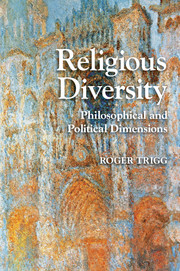Book contents
- Frontmatter
- Dedication
- Contents
- Introduction
- 1 The Challenge of Religious Diversity
- 2 Do Religions Claim Truth?
- 3 Religious Pluralism
- 4 The Roots of Religious Belief
- 5 Does Disagreement Undermine Theism?
- 6 Education and Religious Diversity
- 7 Truth and Coercion
- 8 Religious Diversity and Identity
- 9 Religion as Personal Preference
- 10 Freedom and Religion
- Bibliography
- Index
- References
5 - Does Disagreement Undermine Theism?
Published online by Cambridge University Press: 05 June 2014
- Frontmatter
- Dedication
- Contents
- Introduction
- 1 The Challenge of Religious Diversity
- 2 Do Religions Claim Truth?
- 3 Religious Pluralism
- 4 The Roots of Religious Belief
- 5 Does Disagreement Undermine Theism?
- 6 Education and Religious Diversity
- 7 Truth and Coercion
- 8 Religious Diversity and Identity
- 9 Religion as Personal Preference
- 10 Freedom and Religion
- Bibliography
- Index
- References
Summary
THE ROLE OF REASON
Some theologians and philosophers pass too quickly from a sensus divinitatis to the idea of the Christian God. Alternatively, some of those dealing with the cognitive science of religion are so ready to turn to a naturalistic explanation of all religion that they are willing to lump everything in the one category. In both cases, the challenge of religious diversity can be quickly passed over. Theologians can ignore it by simply concentrating on the tenets of one religion. In the case of naturalism, an apparent scientific explanation may explain “religion” but goes nowhere in explaining “diversity.”
From a theological point of view, some see diversity as a greater obstacle to faith than the existence of evil in the world. If it seems difficult to imagine that a good God could allow so much human suffering, by the same token, why would a caring God be ready to leave so many humans in ignorance of His nature? The atheist can easily say that when there are so many competing beliefs about what is true of the gods, God, or whatever, there is no principled reason for preferring one over the other. They are all to be accounted equally false, an accidental effect of some external influence. When there is no agreed-on way of deciding between them, as there is in scientific method, why not dismiss them as catchy stories that may appeal to the human mind? The myths about the gods transmitted by Homer can easily, it seems, be put into that category. Why not every other story about God? The cognitive science of religion shows how the human mind can latch on to stories that are “minimally counterintuitive,” stories that catch our interest because they are unusual but not excessively so. We can easily remember them, whether they are about talking frogs or beings with supernatural powers.
- Type
- Chapter
- Information
- Religious DiversityPhilosophical and Political Dimensions, pp. 77 - 95Publisher: Cambridge University PressPrint publication year: 2014

